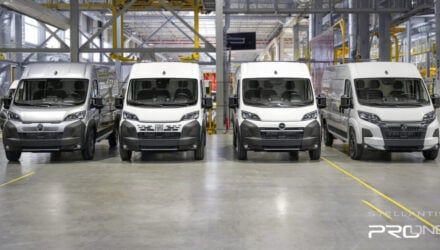In 2022 Battery Electric Vehicles (BEVs) comprised 16.6% of all new vehicle registrations, surpassing diesel for the first time to become the second most popular powertrain after petrol. Whilst it’s clear that increasing numbers of fleet operators are making the switch to the latest zero emission vehicles, Venson Automotive Solutions is urging businesses to maximise their BEV investment by ensuring the vehicles are fully-equipped for service.
While new vehicles come with the promise of maximising payload efficiency and getting the job done efficiently, unless vehicles meet operational needs, businesses could be waiting some time for their return on investment.
 Alison Bell, Operations Director at Venson Automotive Solutions explains, “When fitting out a commercial fleet there is always a careful balancing act to play between maximising efficiency and keeping a watchful eye on Total Cost of Ownership (TCO). That’s why it’s so important to choose an LCV fleet supplier who can advise on how to get the right conversion and fittings, such as external roof systems and internal storage, ventilation and security, to ensure the most appropriate layout for the vehicle, which in turn, will deliver operational cost savings.
Alison Bell, Operations Director at Venson Automotive Solutions explains, “When fitting out a commercial fleet there is always a careful balancing act to play between maximising efficiency and keeping a watchful eye on Total Cost of Ownership (TCO). That’s why it’s so important to choose an LCV fleet supplier who can advise on how to get the right conversion and fittings, such as external roof systems and internal storage, ventilation and security, to ensure the most appropriate layout for the vehicle, which in turn, will deliver operational cost savings.
“While it’s great for an LCV to look good, a van is a work horse, not a show pony. Getting the job done efficiently is the prime concern. Key to this is getting relevant stakeholders input into the conversion requirements. So selecting an LCV supplier who will take time out to listen carefully and understand the job required of the vehicle means a conversion that will ensure employees will get their work done efficiently and safely, while at the same time helping the business control its operational costs.”
It is not only the daily functionality of vehicle modifications that need to be factored in. Fit-outs can have a huge impact on TCO. With the escalating cost of fuel, electric or otherwise, commercial fleet operators should bear in mind the extra weight of certain fittings and ask themselves if they are ‘nice to have’ or essential.
Concludes Alison Bell, “It may not be front-of-mind when acquiring a new van, but businesses should always consider what will happen to the fit-out at the end of the contract. Can it be reused? Are there any additional costs that might be incurred in transferring the equipment to a different vehicle? It’s fantastic to see that commercial fleets are switching to zero and lower emission vehicles, but consideration must be made before purchase of the day-to-day needs of these vehicles and the de-fleeting process to maximise resale values.”








